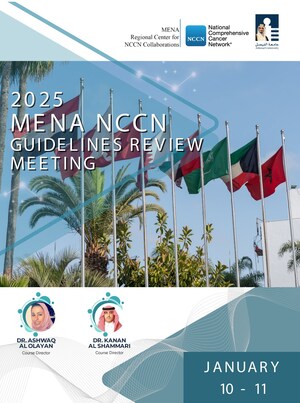"The NCCN Distress Thermometer has been helping to normalize and encourage discussion of distress as a standard part of oncology patient visits since 1997," said Michelle Riba, MD, MS, University of Michigan Rogel Cancer Center, Chair of the NCCN Clinical Practice Guidelines in Oncology (NCCN Guidelines®) Panel for Distress Management. "We recently overhauled this free one-page resource to be even more user-friendly and inclusive. Distress screening should be a routine part of cancer care for everyone, everywhere. By making this free resource even easier to understand and use, as well as more accessible, we hope all people with cancer will receive the support they need in order to achieve the best possible outcomes."
The tool includes a simple scale for indicating the amount of distress a patient is experiencing. It also features a straightforward checklist of concerns covering different domains, including:
- Physical;
- Emotional;
- Practical;
- Social;
- and Spiritual or Religious.
In addition to the one-page NCCN Distress Thermometer and Problem List, there are full NCCN Guidelines® for Distress Management containing evidence-based expert consensus recommendations intended for health care providers. There are also NCCN Guidelines for Patients®: Distress During Cancer Care with the same information in an accessible format to empower patients and caregivers to participate in shared decision-making.
The updated NCCN Distress Thermometer translations are part of NCCN's ongoing efforts to make NCCN Guidelines and associated clinical resources more accessible for non-English speakers. It is now available in the following languages, in addition to the original English:
* Indicates the Distress Thermometer has been published in multiple versions of the language.
"On World Mental Health Day and every day, we want to uphold the fact that addressing emotional distress is a key part of patient care," said Robert W. Carlson, MD, Chief Executive Officer, NCCN. "We hope our work helps reduce any stigma or burden, enabling these important discussions around emotional wellbeing."
Independent researchers recently published a study in Psycho-Oncology examining 39 peer-reviewed articles validating the use of the NCCN Distress Thermometer across 25 countries, stating: "This tool has proven to be an effective means to support initiation of the conversation."
The translated NCCN Distress Thermometer can be found at NCCN.org/distress-thermometer-translations.
Visit NCCN.org/global to learn more about free cancer care resources for different regions and languages, and join the conversation online with the hashtag #NCCNGlobal.
About the National Comprehensive Cancer Network
The National Comprehensive Cancer Network® (NCCN®) is a not-for-profit alliance of leading cancer centers devoted to patient care, research, and education. NCCN is dedicated to improving and facilitating quality, effective, equitable, and accessible cancer care so all patients can live better lives. Visit NCCN.org for more information on the NCCN Clinical Practice Guidelines in Oncology (NCCN Guidelines®) and other initiatives. Follow NCCN on Facebook @NCCNorg, Instagram @NCCNorg, and Twitter @NCCN.
Media Contact:
Rachel Darwin
267-622-6624
[email protected]
Photo - https://mma.prnewswire.com/media/1913527/2022_Distress_Thermometer_horizontal.jpg
Logo - https://mma.prnewswire.com/media/441768/NCCN_Logo.jpg








Share this article